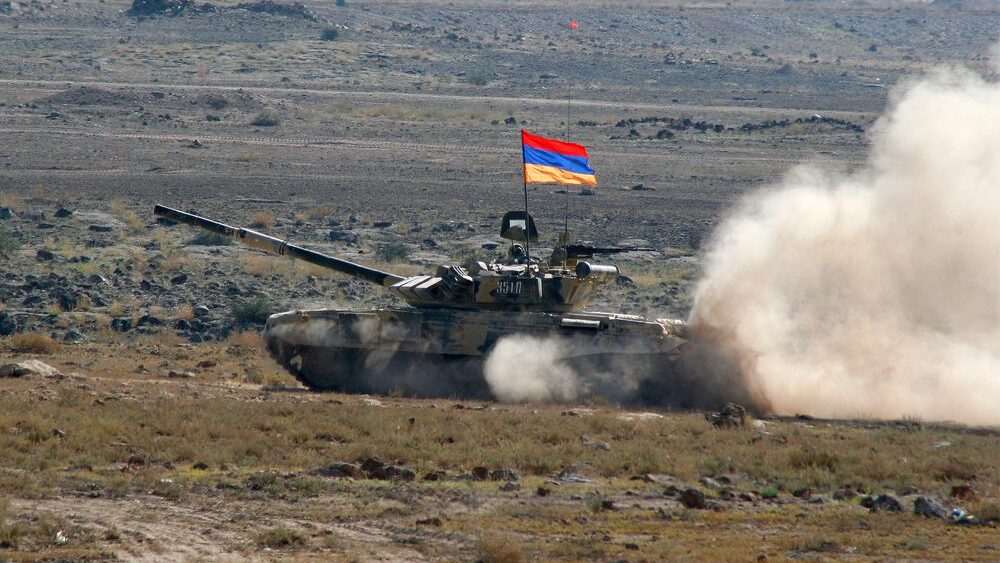
Armenian Foreign Minister Ararat Mirzoyan touched down in Brussels this week to shore up his country’s relationship with the EU, as reports emerged of skirmishes between Armenian and Azeri forces that left four Armenian soldiers dead.
With renewed fears of yet another invasion by Azerbaijan—following last year’s ethnic cleansing of Christian Armenians along the Lachin corridor—the EU is inching towards taking a more confrontational approach to Azeri aggression. The change of direction in recent months comes at the behest of the Macron government and the lobbying efforts of the Armenian diaspora in Paris.
Following a meeting with Mirzoyan and other Armenian diplomats, EU foreign policy boss Josep Borrell floated possible future non-lethal military assistance for Yerevan, alongside an economic cooperation package designed to better link Armenia to the European community, including visa liberalisation.
Ravaged by three years of intermittent conflict with the Turkish-backed Azeri military, Armenia is moving away from its traditional alliance with Russia. The EU now seeks to fill the geopolitical void left by Moscow, coinciding with the bloc’s accession talks with neighbouring Georgia.
🇦🇲IS ARMENIA GOING TO BE INVADED?
— Mario Nawfal (@MarioNawfal) February 15, 2024
PM of Armenia has claimed Azerbaijan is plotting a 'full-scale war' against his country.
Sec. Blinken has alerted U.S. lawmakers of a potential Azerbaijani invasion.
Sources: Armenian Weekly, Al Jazeera, Reuters pic.twitter.com/jIYlhZEe4o
Despite a major reliance on Azeri gas—often bootlegged from Russia itself—the EU has been gradually moving towards a pro-Armenian position over the past year, with EU observers already active in the region (occasionally coming under Azeri gunfire).
Although it has developed a deepeed security cooperation with Yerevan, the EU fell short of providing a full military guarantee. Armenian Prime Minister Nikol Pashinyan warned Thursday that his nation faced an imminent invasion from Azerbaijan, with the Baku government aspiring to capture a land bridge linking its territory to the Azeri enclave of Nakhchivan.
Fresh from what most experts regard as a rigged election, Baku’s autocratic President Aliyev has been increasingly vocal against Armenia. Last month the European Parliament heard about the threat posed to the country’s Christian heritage in the recently captured Nagorno-Karabakh region.
Aliyev said the Armenia-Azerbaijan normalization process should no longer be part of other countries' agendas; they should mind their own business.
— Lindsey Snell (@LindseySnell) February 14, 2024
AZ demands the EU Mission leave Armenia, calls Armenia's border "conditional," attacks Syunik.
AZ's plans could not be clearer. pic.twitter.com/AHx2Adf3QT
Outlining the need for a more hawkish EU approach to Azeri aggression, former Armenian diplomat and security expert Sossi Tatikyan told The European Conservative that Brussels was still seen as “soft” in the region despite the recent deployment of observers.
Given Azerbaijan’s role as a supplier of 3-4% of energy for EU, the EU should use conditionality in its relationship with Azerbaijan to make it return to the peace negotiations and to stop applying military-political coercion in collaboration with Russia.
Tatikyan went on to advocate that Armenia be included in the European Peace Facility, the collective EU military war chest currently actively funding Ukraine. Led by France, greater EU financial and even military support looks increasingly likely in the coming weeks and months.
